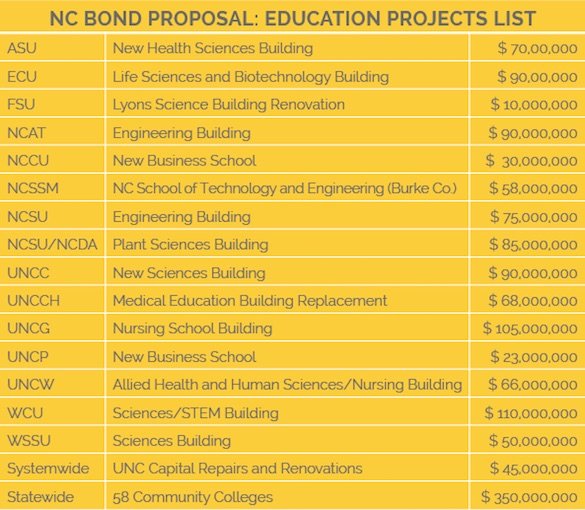RALEIGH (Sept. 30, 2015) – A bright spot for higher education in the final days of the 2015 General Assembly is a $2 billion bond package that North Carolina voters will be asked to approve next March.
“What are we buying here? Houses of knowledge, factories of knowledge,” declared Rep. William Brawley, R-Mecklenburg, senior chair of the House Finance Committee. “Of course it makes sense to finance those over 20 years.”
The House gave final approval to the bond proposal early Wednesday morning by a vote of 93-20. The measure now awaits Gov. Pat McCrory’s signature.
Included are more than $980 million for projects at 14 state universities and $350 million for projects at all 58 community colleges. The referendum would be held in conjunction with North Carolina’s presidential primary, which legislators have tentatively scheduled for March 15.
The bonds should help build capacity for higher education as North Carolina – now the nation’s 9th-largest state – continues to grow and demands increase for an educated workforce.
A study released this year found that state colleges and universities have a combined economic impact of almost $50 billion a year on North Carolina’s economy.1
Rep. Dean Arp, R-Union, said debt from the bonds will not require a tax increase.
“Do you think interest rates will be lower in the future than they are right now?” he asked. He added that even when the bonds are issued, the state will face less debt in six years than it does now.
Arp and Brawley emphasized that university projects in the package focus on high-demand STEM (science, technology, engineering and math) fields, preparing students for what Brawley called “jobs that don’t yet exist.”
The university projects include eight science, two engineering, two nursing, one medical and two business school buildings.2
After years of postponed maintenance, though, one area where the package comes up short is funds for repairs and renovations to university buildings. The Board of Governors that oversees the state university system requested $500 million from the legislature over six years for repair projects.3
Legislators provided $105 million: $50 million in their budget for 2015-16,4 $10 million in bonds for renovation of a science building at Fayetteville State University, and $45 million in undesignated bond funds for repairs and renovations.5
They also included a provision in the budget that will allow universities to carry forward an additional 2.5% of their budgets for use on repair, renovation and capital projects.6
Brawley said our public universities still need more capacity. He pointed to UNC Charlotte, which he said is absorbing 46% of the growth of students in the UNC system.
“I’ve got an undergraduate there, and I know how hard it is for her to get classes,” he said.
1 http://www.northcarolina.edu/economic-impact-2015; http://www.nccommunitycolleges.edu/sites/default/files/basic-page-file-uploads/nccc_execsum_1213_final_datedfeb2015.pdf.
2 http://www.ncleg.net/Sessions/2015/Bills/House/PDF/H943v6.pdf, pp. 3-4.
3 http://www.northcarolina.edu/apps/bog/doc.php?id=45125&code=bog
4 http://www.ncleg.net/Sessions/2015/Bills/House/PDF/H97v9.pdf, p. 402.
5 http://www.ncleg.net/Sessions/2015/Bills/House/PDF/H943v6.pdf, p. 4.
6 http://www.ncleg.net/Sessions/2015/budget/2015/H97-PCCS30420-LRxfr-6.pdf, pp. 408-409.


Leave a Reply